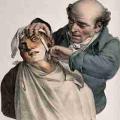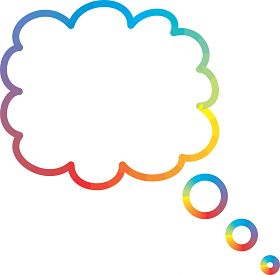273. What Do You Think? Ockham on Mental Language
How the language of thought relates to spoken and written language, according to William of Ockham.
Themes:
• D.J. Brown, “The Puzzle of Names in Ockham’s Theory of Mental Language,” Review of Metaphysics 50 (1996), 79-99.
• E.W. Hagedorn, “Ockham’s Scientia Argument for Mental Language,” Oxford Studies in Medieval Philosophy 3 (2015), 145-68.
• M. Lenz, “Why is Thought Linguistic? Ockham’s Two Conceptions of the Intellect,” Vivarium 46 (2008), 302-17.
• C. Normore, “Ockham on Mental Language,” in J.C. Smith (ed.), Historical Foundations of Cognitive Science (Dordrecht: 1990), 53-70.
• C. Panaccio, “From Mental Word to Mental Language,” Philosophical Topics 20 (1992), 125-47.
• C. Panaccio, Mental Language: From Plato to Ockham, trans. J.P. Hochschild and M.K. Ziebart (New York: 2017).
• P.V. Spade, “Synonymy and Equivocation in Ockham’s Mental Language,” Jounral of the History of Philosophy 18 (1980), 9-22.
• P.V. Spade (ed.), The Cambridge Companion to Ockham (Cambridge: 1999): the papers by Panaccio and Chalmers.
• J. Trentman, “Ockham on Mental,” Mind 79 (1970), 586-90.
• M. Yrjönsuuri, “Supposition and Truth in Ockham’s Mental Language,” Topoi 16 (1997), 15-25.







Comments
Mental language of inventors
Dr Adamson -
as the saying goes, "long time, first time". But after listening to this episode of HoPWAG, I wondered about how Ockham accounted for the mental language of objects that do not materially exist in the world, but might, as in the minds of inventors. If I missed it in the episode, I really am sorry. Anyway, two unrelated items came to mind:
- the joy buzzer: there was a time when this object did not exist in the world at all, but then it was invented. Nothing like it had had prior existance in the world, but then it did exist as a physical object, due to the mental language and physical effort of humans, starting with one person (from what I can tell). How does one have a conception of that which does not, but might yet, exist in the world, according to Ockham?
- the compiler: I listen to the very interesting podcast "50 Thing That Made The Modern Economy", from BBC Radio 4, and they covered Grace Hopper's extraordinary invention on one of their episodes. This is a harder one for me, as Hopper invented something with which we can have no sense experience, something that has no physical, unique existence except as a series of electrical communications - yet we perceive the compiler as having real existence, since it actually acts in the world! Oof. My brain hurts.
If you are able to give a brief reply as to how Ockham approached the topic of non-existent but potential objects, that would be awesome beyond the wonderment of Clara Bow - no, that's not true, Clara Bow is Clara Bow. But the answer to my question might come in the next episode's interview, so I can wait with Hiawatha as she weeps for the loss of her kind until then. Thank you so much for continuing to provide this extraordinary resource - I gave your first book of podcast transcripts to my sister, which she greatly appreciated as she entered a new career of teaching history.
In reply to Mental language of inventors by Peter
Inventions
Thanks for writing in - that's an interesting question, and one that poses itself not only for Ockham but for his realist opponents. Like, would they need to say that there is a universal of joy buzzer? Or for Platonists, who already in antiquity queried whether there are Platonic Forms of things humans invent (artefacts). Generally speaking the focus in these traditions is on natural kinds, not on artefacts, in part perhaps because of your point about invention but also maybe because the dividing lines between different types of artefacts, e.g. bench, table, chair, are rather blurry. But I guess that Ockham and others could say that, if you are prepared to say that there is genuinely a well defined type for a given sort of artefact, like joy buzzer, then there could be a term for it in mental language or universal or Platonic Form - whatever the philosopher in question does to explain commonalities or thoughts that are general in scope. Ockham actually has the less counterintuitive view here since he has no need to admit that there is a term in anyone's mind for joy buzzer before it is invented, whereas a Platonist would have to admit that if there is a Form for it at all, that Form has always existed.
Mental Words - What are they?
Peter,
A fascinating episode as ever, but one which raised a number of questions for me.
Ockham thinks that in mental language a mental 'word' represents a pattern of thought invoked by, for example, a spoon. But the mental word must be held in the brain as a thought pattern, so what is the difference between the 'word' and the actual thought pattern that it represents? If the brain wants to think of, say, a spoon sitting on a table, why can't it use the actual thought patterns for a spoon and a table instead of representations thereof. It seems to me that the brain only needs a language of symbols when it talks to something else. When its ruminating internally, it can use its own thought patterns.
Secondly, Ockham seems to think that we all get the same unique pattern of thought when we see a spoon, and his proof of this is that when person A and Person B, who both have previous experience of the spoon, are discussing the subject and Person A says, "Show me the spoon," Person B will indeed produce the object that Person A was thinking of. But this doesn't prove that Person A has the same thought pattern about spoons as Person B, or that their mental 'word' for the spoon is the same. Indeed, all it proves is that the word 'spoon' triggers a thought pattern in Person B sufficiently close to the thought pattern he/she had when first experiencing the spoon to realise that Person A must be referring to the object of which they have shared experience.
Finally, much of Ockham's subsequent reasoning seems to rely on the idea that one pattern of thought is uniquely related to one mental 'word', but that doesn't seem to be right either. Would we have exactly the same pattern of thought if we saw two different spoons? Clearly not, because if this were so, we wouldn't be able to distinguish between them. Yet we'd happily call them both 'spoon'. It seems therefore that even a mental word must be a categorisation of similar mental states, not a unique one. This corresponds to the theory in psychology that we perceive things by understanding what they are not. For example, to use colours as an example, we call things 'orange' because the light coming from them is not long enough in wavelength to call them 'red' nor short enough to call them 'yellow' but that doesn't mean that everything we call 'orange' has the same wavelength.
Regards as always,
Dave M
In reply to Mental Words - What are they? by Dave Martin
Mental words
Hi Dave,
Thanks for that very thoughtful post. So to take your points in turn: the mature Ockham would simply agree with you that the "thought pattern" is what signifies the external object. In fact as far as his theory of signification goes he could easily accept that the mental words are brain events, I think; obviously he does think we have immaterial souls, but that is for separate reasons. He would want to resist the idea that we have a representation between the mental act and the object it grasps, as I discuss in the previous nominalism episode. So I think you and he are on the same page there.
Regarding the second and third points however he will disagree with you: it is important to him that at many, though presumably not all, words do have distinct and definable meanings and that we share those meanings (they are "the same for all" as Aristotle says). This can be explained by the causal process by which they arise: we naturally form mental words to correspond to the same things in the world. Having said that, of course as a nominalist he is of course taking a step in the direction of rejecting the idea that nature is divided up into kinds of things, since there are no real universals or kinds; an implication that will be taken by later authors. But he still wants to uphold the possibility of Aristotelian science which requires us to generalize accurately by using universal concepts.
The relationship between
The relationship between language and thought is one I find really interesting, so this episode was perhaps my favourite of the series (so far!). This idea gets me wondering though, what do you think Ockham would make of the phenomenon of 'verbal overshadowing', where the attempt to linguistically describe something seems to decrease our ability to understand it? (For example, the finding that people asked to verbally describe a face subsequently have increased difficulty in recognising it).
In reply to The relationship between by Jack
Mental language
Thanks, that's an interesting question. I guess your example is problematic since he thinks of mental language as propositional, whereas having a mental image of a face would be non-propositional. I suppose this would be more something done by the imagination (and this wouldn't be real understanding or knowledge for him, just an image). In general, we shouldn't assume that for him that ALL cognition is mental language. Still perhaps we could press your point if we had an example of someone who has knowledge but cannot articulate it, or in the attempt to do so gets confused. There he might say that the problem is the person's facility with spoken language: like, I understand something but I am just not good enough at putting my thoughts (mental language) into words (spoken or written language) so I get tangled up when I try to do so. How does that sound?
In reply to Mental language by Peter Adamson
I think your first point is a
I think your first point is a very good one. It's all too easy for people like me to forget that medievals are working from very different conceptions of the mind than I am, and I think I've been making that mistake in this case. Interestingly enough, in regards to your second point, one of the research findings has suggested pretty much exactly that. They were interested in testing whether or not the effect would be present in experts. Experts, in this context, were assumed to have a more adequate vocabulary for the relevant issue. To that end, they compared the verbal overshadowing effects in wine tasting of regular people to professional wine tasters. The former were found to have a significant verbal overshadowing effect; the latter, by contrast, actually showed modest gains in recognising them.
In reply to I think your first point is a by Jack
Wine
Wow, interesting example! I wonder if Barry Smith knows about this, he is a philosopher I know in London who is interested in the philosophy of wine and other taste experiences.
Julius (a)ka Groucho
In discussing Julius (also) known as Groucho Marx, isn't this a variation of the Eubulides Paradox: "I do not know the hooded man. Turns out that the hooded man is my brother. So, I do not know my brother. But really I do." Did Ockham ever avert to this paradox by name?
In reply to Julius (a)ka Groucho by Fr. John Rickert
Eubulides paradox
Right, that is also sometimes called the "masked man fallacy," and it is a good way of introducing the distinction between intensional and extensional contexts. I actually don't know whether this was discussed in 14th century scholasticism or in Ockham in particular but maybe someone else can enlighten us!
Add new comment